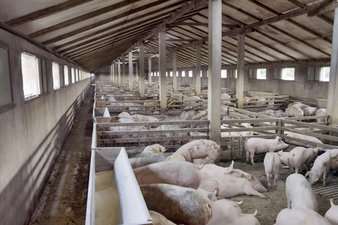Confirmed cases of Senecavirus A found in Ontario pigs
By Jennifer Jackson
Farms.com News Team
A recent release circulated by the Ontario Pork Industry Council confirmed the presence of Senecavirus A in Ontario. The Canadian Food Inspection Agency (CFIA) is conducting testing at any federal processing plants which contain potentially symptomatic swine. If symptomatic animals are found, operations can be halted for up to 72 hours for further testing.
Senecavirus A is part of the same viral family as foot-and-mouth disease (FMDV) and swine vesicular disease (SVDV).
Symptoms of the virus mimic those of FMDV, including:
- Blisters and sores around the mouth, snout, and/or above the hoof,
- Fevers, lameness, decreased appetite and/or energy,
- And increased reports of piglet mortality with/without diarrhea.
Unknown prior to 2002, there are still quite a few uncertainties in dealing with and treating the virus. The CFIA is currently treating the situation as they would deal with FMDV and SVDV.
In September, a number of Canadian pigs shipped to the U.S. had blister-type lesions, yet tested negative at the packing plant for a foreign animal disease. The CFIA then began its own sampling to diminish any potential threat. This sampling lead the CFIA to positive confirmation of Senecavirus A in Ontario assembly yards.

Suljo/iStock/Getty Images Plus
Although the virus is not federally reportable, the United States Department of Agriculture (USDA) is refusing any loads of swine that are showing potential symptoms.
Unlike FMDV, Senecavirus A is only transmissible to swine and is of no risk to humans.
Farms across the province have yet to document any cases.
Lori Moser, manager of Swine Health Ontario, said Senecavirus A “is challenging because although it is not a foreign animal disease (FAD), it can look like a FAD. We are asking our producers to assess pigs carefully because any signs of vesicular disease seen at processing may disrupt production flow until a foreign animal disease is ruled out.”